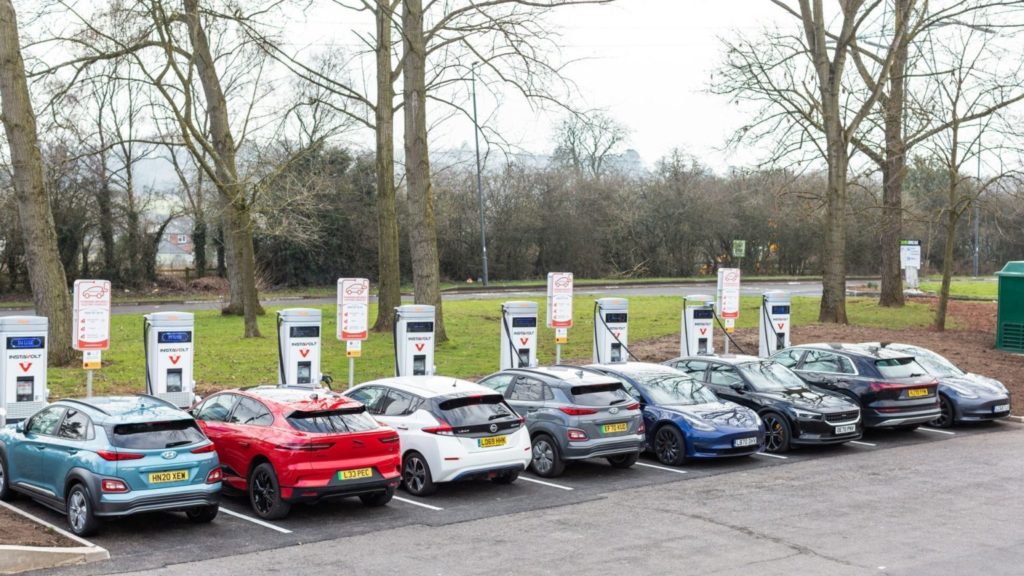The advertisements typically show an electric car parked outside a glassy, futuristic eco house, plugged into its dedicated charging point on a covered driveway. That’s the dream. But what if it isn’t your reality?
Well, it almost can be. Even your home is more ‘semi in the suburbs’ than ‘movie star mansion’, if you have a personal parking space and wall box charger, you can simply arrive back and plug in. By the following morning your EV will be fully charged using cheaper-rate overnight electricity. And you have another day of efficient, quiet and affordable motoring ahead.
The reality for EVs in 2025

Electric cars are generally more expensive to buy than petrol or diesel equivalents (although the gap is narrowing). So far, that means it’s mostly the better-off who can afford them. Hence the smart house with its off-street parking and easily accessible charge point.
Also, many electric cars are used by lower-mileage drivers, due to their range or the limitations of the public charging network. That means towns and cities are their natural habitats: places where off-street parking is more of an issue.
What if you don’t have a parking space?

These are the options if you don’t have a driveway or dedicated parking space for your electric car at home.
1. Run a cable from your house to your car
This isn’t a good idea, frankly. The trip hazard if pedestrians are around is unacceptable. Anyway, you’re probably talking about an extension lead from your home domestic circuit, which is simply too slow for charging an EV – except in emergencies.
2. Public charging points
A fine idea in principle, so long as you can find one nearby. Yet there’s an issue with access if the charge point is in demand – and you’ll need to move your car once it has charged up, then find another parking space near home. Also, charging from public points has become increasingly expensive. It can cost more per mile than filling up with petrol.
3. Charging at service stations
Petrol stations are rolling out charging points for electric cars. It makes sense as more drivers migrate to this greener form of energy. Thus, in the near future, you’ll likely be able to recharge your car all the same places you used to buy petrol or diesel. The process will take more like 30 minutes instead of five minutes, though.

4. Charging while you are shopping
Tesco has worked with Pod Point to install chargers across the majority of its large Tesco Extra stores. You can’t charge for free any more, sadly, but there are fast chargers priced ‘in line with market rates’. Many other supermarkets have chargers on-site now, too.
5. Charging at work
Some businesses feel they can help staff and boost their eco credentials by installing charge points in office car parks. Just don’t expect to rely on these if lots of employees switch to EVs. It’s all too easy for demand to overwhelm supply.
6. Buy a Tesla

Things will change in future, but for now Tesla owners have almost exclusive access to the company’s bespoke charging infrastructure. It’s very fast and you’ll usually find a vacant slot when you arrive. There are more than 1,400 Tesla Supercharger stations in the UK – and 50,000 worldwide.
7. Other high-speed chargers
Perhaps stung by the way Tesla hit the ground running with its Superchargers, the Ionity network was set up as a joint venture between Ford, BMW Group, Daimler-Benz and the Volkswagen Group. It’s offering reliable, high-powered and fast charging across Europe – although the electricity rates aren’t cheap.
In conclusion, then, you can own an electric car if you don’t have a parking space. At present, however, most people will probably find the inconvenience associated with recharging outweighs the benefits of running an EV.
Hopefully by 2035, when new cars with petrol or diesel engines can no longer be sold in the UK, things will be very different.
ALSO READ:
What is Plug & Charge for electric cars?

